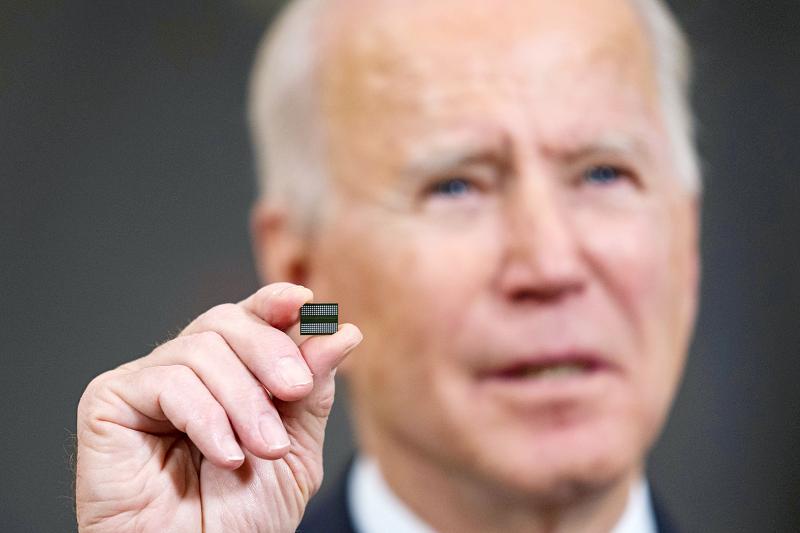US President Joe Biden on Wednesday ordered a review of US supply chains, seeking to end the country’s reliance on China and other adversaries for crucial goods.
However, the process could take months, offering no immediate solution for a shortfall of semiconductors that has idled vehicle production at several US factories.
The Biden administration’s 100-day review is to cover chips, but also large-capacity batteries, pharmaceuticals and strategic materials, such as rare earth elements, a White House statement said.

Photo: Bloomberg
Although Biden did not specifically mention Taiwan on this occasion, the US last month appealed to Taiwan to help with the semiconductor shortages.
Media outlets such as Japan-based Nikkei Asia have also reported that Washington is expected to pursue partnerships with Taiwan, Japan and South Korea in chip production.
Minister of Economic Affairs Wang Mei-hua (王美花) has reiterated that Taiwan is a reliable economic partner of the US.
“When it comes to the semiconductor industry, information and communications technology products, and biotech, the US and Taiwan have a track record of working closely together,” Wang said. “We are undeniably trustworthy partners.”
The signing of a memorandum of understanding regarding Taiwan-US economic prosperity would deepen bilateral ties, Wang added.
As a long-term and reliable partner of the US, the government would continue to work with Biden’s administration to deepen Taiwan-US global partnership and trade ties, Ministry of Foreign Affairs spokeswoman Joanne Ou (歐江安) said yesterday in a statement.
A US-Taiwan alliance in the semiconductor field would be good news for Taiwanese firms, said Liu Pei-chen (劉佩真), a researcher at the Taiwan Institute of Economic Research (台灣經濟研究院).
Biden’s review is not aimed at China or any other specific country, but instead focuses on diversifying supply more generally, said White House officials, who spoke on condition of anonymity.
Still, an overreliance on China and other adversaries for critical goods is a key risk that must be addressed, they said.
Biden met with US lawmakers at the White House to discuss the semiconductor shortage and ways to bolster supply chains.
US Senate Majority Leader Chuck Schumer said that he is asking the chamber’s top lawmakers to draw up legislation aimed at improving US competitiveness with China in manufacturing and technology, including bolstering the supply of US-made semiconductors.
The US semiconductor industry has been pushing Biden to include tax breaks and other financial incentives in his next legislative package to spur investment and research in the US — an effort that would take months to move through the US Congress.
Biden’s order would also direct industry-specific reviews focused on defense, public health and biological preparedness, as well as information and communications technology, transportation, and energy and food production, the White House said.
Those assessments, to be completed within one year, would be modeled after reviews that the US Department of Defense uses to regularly evaluate the US defense industry.
Additional reporting by Angelica Oung, Lin Chia-nan and CNA

Right-wing political scientist Laura Fernandez on Sunday won Costa Rica’s presidential election by a landslide, after promising to crack down on rising violence linked to the cocaine trade. Fernandez’s nearest rival, economist Alvaro Ramos, conceded defeat as results showed the ruling party far exceeding the threshold of 40 percent needed to avoid a runoff. With 94 percent of polling stations counted, the political heir of outgoing Costa Rican President Rodrigo Chaves had captured 48.3 percent of the vote compared with Ramos’ 33.4 percent, the Supreme Electoral Tribunal said. As soon as the first results were announced, members of Fernandez’s Sovereign People’s Party

EMERGING FIELDS: The Chinese president said that the two countries would explore cooperation in green technology, the digital economy and artificial intelligence Chinese President Xi Jinping (習近平) yesterday called for an “equal and orderly multipolar world” in the face of “unilateral bullying,” in an apparent jab at the US. Xi was speaking during talks in Beijing with Uruguayan President Yamandu Orsi, the first South American leader to visit China since US special forces captured then-Venezuelan president Nicolas Maduro last month — an operation that Beijing condemned as a violation of sovereignty. Orsi follows a slew of leaders to have visited China seeking to boost ties with the world’s second-largest economy to hedge against US President Donald Trump’s increasingly unpredictable administration. “The international situation is fraught

MORE RESPONSIBILITY: Draftees would be expected to fight alongside professional soldiers, likely requiring the transformation of some training brigades into combat units The armed forces are to start incorporating new conscripts into combined arms brigades this year to enhance combat readiness, the Executive Yuan’s latest policy report said. The new policy would affect Taiwanese men entering the military for their compulsory service, which was extended to one year under reforms by then-president Tsai Ing-wen (蔡英文) in 2022. The conscripts would be trained to operate machine guns, uncrewed aerial vehicles, anti-tank guided missile launchers and Stinger air defense systems, the report said, adding that the basic training would be lengthened to eight weeks. After basic training, conscripts would be sorted into infantry battalions that would take

GROWING AMBITIONS: The scale and tempo of the operations show that the Strait has become the core theater for China to expand its security interests, the report said Chinese military aircraft incursions around Taiwan have surged nearly 15-fold over the past five years, according to a report released yesterday by the Democratic Progressive Party’s (DPP) Department of China Affairs. Sorties in the Taiwan Strait were previously irregular, totaling 380 in 2020, but have since evolved into routine operations, the report showed. “This demonstrates that the Taiwan Strait has become both the starting point and testing ground for Beijing’s expansionist ambitions,” it said. Driven by military expansionism, China is systematically pursuing actions aimed at altering the regional “status quo,” the department said, adding that Taiwan represents the most critical link in China’s